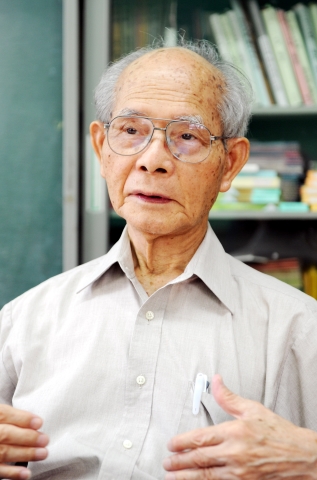Government has responsibility to face up to tragedies of that battle

Former president of Okinawa Christian Junior College Mr Shigeaki Kinjo
The experiences of Shigeaki Kinjo – as told to students at Okinawa Christian University
“It felt like a living hell, it was a nightmare,” says 85 year old Shigeaki Kinjo of his wartime experiences on Tokashiki island, Okinawa. As the 69th anniversary of the end of the Battle of Okinawa approaches, Kinjo is still haunted by what he did as a youngster, when his island was transformed into a grueling battlefield.
The only ground battle of World War II fought on Japanese soil, the Battle of Okinawa raged for almost three months. Over 200 000 people died, including both Japanese and American soldiers but overwhelmingly the victims were Okinawan civilians.
One of the most gruesome tragedies of that battle happened in March 1945 on the Kerama islands – about 30 km off the coast of Naha. On the 26th, some 300 people died in a group suicide on Zamami island. The following day, another 300 perished in similar fashion on neighboring Tokashiki island.
16 year old Kinjo and his family were among those who were gathered together by the Japanese army on Tokashiki Island on March 27th. They had been ordered to assemble in the village of Nishiyama Previously, Kinjo’s life had been a happy one but the war turned people into killers, and it would turn him into a killer too.
Grenades were handed out to those gathered in Nishiyama and the village mayor said Banzai (Long live the Emperor) three times. He says, this was interpreted to mean something like, “you should die.” In those days people had been taught in school that suicide “is much better than being killed by the American army.” They instinctively believed that, “Many Japanese soldiers have died for our country so we should die with them. We should kill ourselves before the Americans kill us.”
So the people prepared to commit suicide using the grenades. However, many of the grenades they’d been given were faulty and failed to detonate. So only a few were killed by the explosives. Those who survived immediately turned on their own families, using knives, sickles or stones to kill them. One man stabbed his wife and children with a broken branch. The air was punctuated with the sound of screaming and groaning. It was, he says, like a scene from the inferno.
Kinjo too, along with his older brother, attacked his mother, younger brother and sister with stones. He says, “I don’t remember the moment I and my brother killed them. I was of unsound mind.” More than half of the population of Tokashiki island died that day.
After they’d killed their loved ones, Kinjo and his brother made up their minds to take their own lives. As they were planning to do so, a boy of about the same age came out of nowhere and suggested they attack the US soldiers instead. Believing they would be killed in the process, he reasoned that at least they wouldn’t have to kill themselves.
However, fate intervened and before Kinjo had a chance to encounter any Americans he came across some Japanese troops. He was shocked to see that they were still alive. He thought the Japanese soldiers would also have killed themselves for their Emperor. He recognized at once the double standard – one rule for the civilians and another for the troops – and was left with a strong sense of betrayal. There and then, he changed his mind and decided against killing himself. Much later, after the war, he realized that mass suicides like those in the Keramas had only happened in places where the Japanese army was present.
Ultimately Kinjo was caught by the US soldiers and taken prisoner. He wasn’t harmed or mistreated by the Americans who distinguished between those who were “Okinawan” and those who were “Japanese.”
At the end of the war Kinjo was racked with guilt. He bitterly regretted that he had killed his family but couldn’t manage to take his own life. Then a chance encounter with a Christian, a Mr Tanahara, led to him to discover the bible. He came across words like, “eternal life” and “forgiveness” and became a Christian himself, coming to believe in the preciousness of human life. Kinjo later help establish Okinawa Christian Junior College.
It was during a recent visit back to this same College, where we are now students, that he told us about these awful events. He says he continues to talk about his experiences, even in old age, in an effort to prevent further bloodshed. “I will never forget what I saw and what I did in the war and so I tell my horrible story.” He adds that the Japanese government also has a responsibility to face up to what the country did more than half a century ago. And in the future, he says, they should make a more concerted effort to get along, not only with America, but also with China and Japan’s other neighbors.
(This contributed article is written by the students of the Investigative Reporting Class, Okinawa Christian University and edited by Michael Bradley)
Previous Article:Nago city council asks governments to cancel expanding restricted US-military sea area in Henoko
Next Article:Seal appears in the sea of Tokashiki Island
[Similar Articles]
- 2012 Textbooks: All seven refer to “group suicide”
- Tokashiki Village holds memorial service for mass suicide victims
- 77 years after compulsory mass-suicide in Tokashiki, descendants pray for peace and against war on behalf of victims
- Editorial: Unforgivable destruction at Chibichiri-gama desecrates the spirit of “nuchi du takara”
- Okinawan and Sri Lankan students meet on Tokashiki
 Webcam(Kokusai Street)
Webcam(Kokusai Street)


